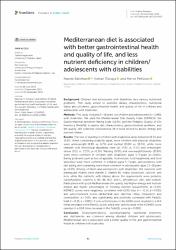| dc.identifier.citation | Bakırhan, H., Özkaya, V. ve Pehlivan, M. (2023). Mediterranean diet is associated with better gastrointestinal health and quality of life, and less nutrient deficiency in children/adolescents with disabilities. Frontiers in Public Health, 11. https://dx.doi.org/10.3389/fpubh.2023.1243513 | en_US |
| dc.description.abstract | Background: Children and adolescents with disabilities face various nutritional problems. This study aimed to examine dietary characteristics, nutritional status and problems, gastrointestinal health, and quality of life in children and adolescents with disabilities. Methods: This study included 5–18 years old children and adolescents (n = 1,991) with disabilities. We used the Mediterranean Diet Quality Index (KIDMED), the Gastrointestinal Symptom Rating Scale (GSRS), and the Pediatric Quality of Life Inventory (PedsQL) to assess diet characteristics, gastrointestinal problems, and life quality. We collected retrospective 24-h food record to assess energy and nutrient intakes. Results: The rate of stunting in children with disabilities varies between 16.5% and 19.8%. When comparing disability types, more children with physical disabilities were underweight (8.8% vs. 6.7%) and stunted (19.8% vs. 16.5%), while more children with intellectual disabilities were tall (7.9% vs. 5.5%) and overweight/obese (21.1 vs. 17.2%; p < 0.05). Wasting (9.3%) and overweight/obesity (23.8%) were more common in children with disabilities aged 5–7 years (p < 0.001). Eating problems such as loss of appetite, food refusal, food neophobia, and food selectivity were more common in children aged 5–7 years, and problems with fast eating and overeating were more common in adolescents aged 13–18 years (p < 0.05). Among children and adolescents with disabilities, the nutrients with inadequate intakes were vitamin E, vitamin B1, folate, potassium, calcium, and iron, while the nutrients with intakes above the requirements were proteins, carbohydrates, vitamins A, B2, B6, B12, and C, phosphorus, zinc, and sodium. Participants with good Mediterranean diet quality had higher energy and nutrient intakes and higher percentages of meeting nutrient requirements (p < 0.05). KIDMED scores were negatively correlated with GSRS total (r = −0.14, p < 0.001) and subcomponent scores (abdominal pain, diarrhea, reflux, indigestion, and constipation; p < 0.05), and significantly and positively correlated with PedsQL total (r = 0.12, p < 0.001). A one-unit increase in the GSRS score resulted in a 14.4 times decrease in the PedsQL score, and a one-unit increase in the KIDMED score resulted in a 10.8 times increase in the PedsQL score (p = 0.001). Conclusion: Overweight/obesity, stunting/wasting, nutritional problems, and deficiencies are common among disabled children and adolescents. Mediterranean diet is associated with a better quality of life, and gastrointestinal health in children with disabilities. | en_US |



















